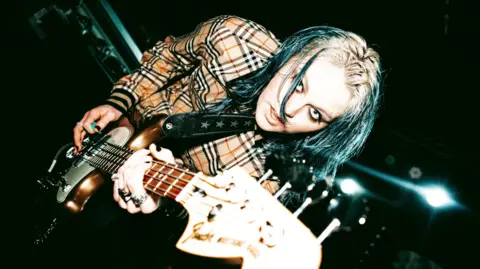 that
thatIn the past, talking about your mental health issues and alcoholism in public was considered unheard of.
But now, in an industry where these issues are common, singers, including Billie Eilish, Demi Lovato and Lewis Capaldi, are digging deeper and sharing their personal experiences, helping many fans “feel they are seen”.
Following their lead, a growing number of artists are speaking out to convey the message that it’s okay to speak up.
lleo, who makes what she calls “bipolar pop”, says the reaction from her fans has been “crazy” since she started singing about her mental experience.
The Cheltenham singer, who has bipolar disorder, said: “People reach out and say ‘this song really helps me.’
Swindon-born singer-songwriter Athena Aperta, 26, also hopes her “honest words” will give listeners hope.
He has been sober for two years, but says his mental health, alcohol and drug problems all worsened after becoming involved in the London music scene, where drug abuse is rampant. when it was “very common”.
He said getting a job near his hometown in 2022 was actually a “blessing in disguise”, helping him overcome his addiction.
He said: “There are still drugs, there are people who drink alcohol,” but added that he is now able to “take more care of himself” if he is in the area.
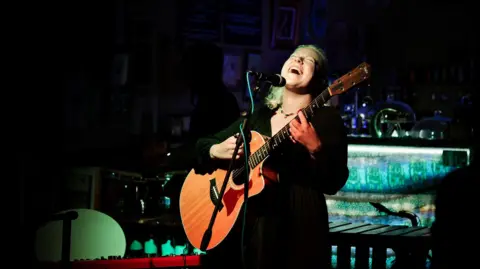 Gideon Liddiard
Gideon LiddiardAthena recently received funding from the Youth Music Awards: Next Generation to release two singles, including Facing the Sunwhich is “about living with anxiety, depression, CPTSD [Complex post-traumatic stress disorder] and being a people pleaser. ”
“There is a lack of hope in the world at this time. I just want to give that to people,” he said.
A Census 2023 with the help of singers he found that about a third of musicians had mental health problems.
Grace Meadows, head of mental health charity Help Musicians, Music Minds Matter, said: “Not knowing that support is out there or who to turn to for support can lead to behaviour. , such as substance abuse, that compound rather than reduce mental health problems.”
He explained “the prevalence of drugs and alcohol throughout the industry” could make this worse.
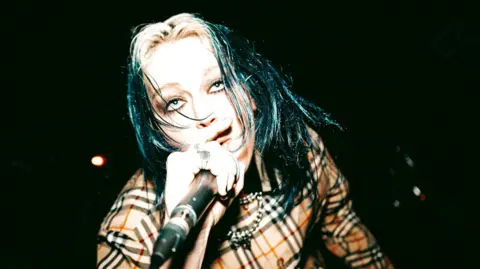 that
that“Making music is very difficult,” says lleo, who has dealt with serious mental health issues for years.
“There were a lot of points where I thought, ‘I wish I could just do something else.’
But the singer said “you need to get out and music is the way to do that”.
After the release of his song medicineswhich is about anti-depressant medication which in his words “took me a lot”, he said the reaction was “very amazing and amazing”, with fans meeting and sharing similar stories.
“It was really crazy for people to want to open up about something like that,” he said.
“It makes me feel very depressed.”
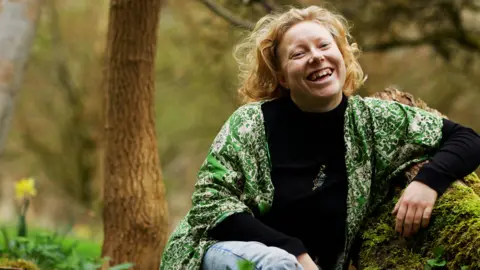 Photo by Josephine Slade
Photo by Josephine SladeAthena, who has performed at festivals including Boomtown Fair and London Pride, has suffered from anxiety and depression since the age of 13 and later developed issues with alcohol and drugs.
He said that this got worse when he was working in a late night scene and was performing in London.
He said: “There was one day where I was drugged at one o’clock in the evening on a Tuesday.
“That’s when I thought, ‘oh I’m really into it’.”
He explained that he suddenly found himself “in a relationship” with people who were “probably very dangerous”.
‘Escape Method’
He said the pressure musicians put on themselves as creators, linked to “lack of self-esteem” can often increase feelings of depression and anxiety, with many turning to alcohol or drugs as a “way to cope”. escape”. .
Minds Matter Music said that the causes of mental health problems for people in the music industry can also include “insecurity around job security, role pressure, stress performance and unsustainable working methods”.
Ms Meadows said this has recently been compounded by Brexit regulations, the pandemic and the cost of living crisis, which she says has “put a lot of pressure on everyone working in music”.
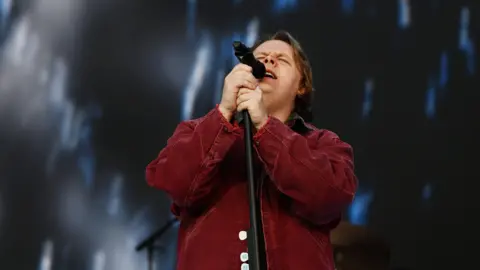
“A lot needs to be done to help musicians with their mental health,” said lleo, whose music is supported by BBC Radio 1.
He added that he really wants to hear more men talking about it in their music.
lleo said, despite this, music was “the most important tool” for him to express his feelings and helped the artist to explain to his parents things that he could not I say them out loud because they are “too painful, too uncomfortable”.
Ms Meadows advised anyone in the industry with a mental health problem or issue to contact Music Minds Matter via their website or their free and confidential 24/7 support line.
If you have been affected by any of the issues in this article, more help and support can be found at BBC Action Line.
#musicians #open #mental #lives
